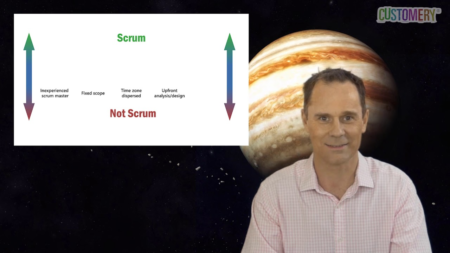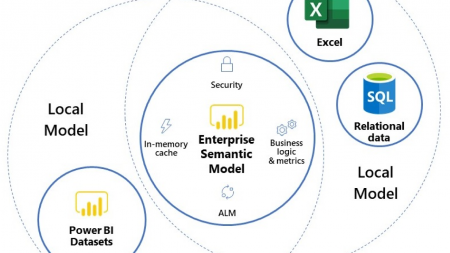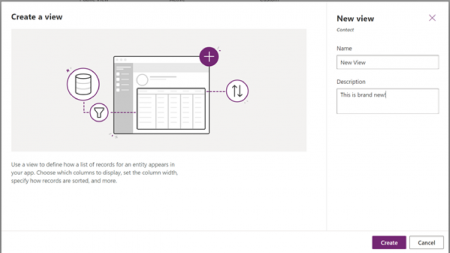Is Scrum the perfect approach for every Microsoft Business Application? No! Many, but not all, Dynamics 365, Power Apps, and Power BI applications benefit from a Scrum approach. Find out in this video when to use Scrum and when to adopt an alternative approach.
Power Platform
The Scrum Dynamics podcast and vlog is back!
In this episode, Jonas Wauters from KPMG Belgium, asks for advice on pitching Dynamics 365 with Scrum to prospective clients who always want to know: What is going to be delivered? When is it going to be delivered? How much is it all going to cost.
When the scope, timeline and costs are fixed in agile projects, how can we possibly answer these questions? Listen in to find out.
In this introduction to the Scrum agile framework for Microsoft Dynamics 365 projects, you’ll learn the basics of Scrum events, roles, deliverables and theory. You’ll also learn about some advanced agile practices you can apply to Dynamics 365 as well as when to use Scrum.
Learn about customer service insights and Power Virtual Agent (Bot) capabilities to improve your customer service and experience. This introductory session will also highlight a Power Virtual Agent (Bot) demonstration.
An amazing panel of speakers responsible for the Center for Excellence (CoE) Starter Kit spoke about the new enhancements of ALM components. This will include out of the box Azure DevOps pipelines and GitHub Workflow templates to help set you up for success with working with solutions.
Mohammed does an awesome job of explaining how Power BI can be leveraged to understand the “What”, “Why”, “What Will” (predictive), and “How” for Data Analytics. I like the way he breaks these down with examples of Power BI visual tools to use. He has a LOT more videos on his channel: https://www.youtube.com/TAIK18
With the December 2020 release of Power BI Desktop we got an early christmas present. A loooong waited feature that will change how we build Power BI solutions! The feature is called “DirectQuery for Power BI datasets and Azure Analysis Services” also known as Composite Models Gen2.
Power BI can represent an intimidating transformation in the way many teams still interact with their data. When well-wielded, we’ve seen Power BI be a catalyst for adoption of data-driven decision-making in a number of our clients’ organizations. This session will center around lessons learned from working with a number of Fortune 500 companies, including: conversations that build trust and consensus at each step of implementation, tips and tricks for building reports for many different typesof audiences, and ideas for keeping solutions relevant and actionable.
This session gives you an overview how Microsoft Power BI can be deployed. The Focus is on the Cloud, Hybrid and on Premises. After the session you will have an idea which type should be the best for each scenario, because every project has different requirements. So there is no right or bad way – it depends on the project and also on the budget and some other regularities.
This “how-to” blog will show you the steps needed to set up Power Automate to generate dynamic documents for Dynamics 365
Microsoft Power Apps is a great option for businesses, as it’s a Low-Code Application Platform (LCAP) that makes it easy for professional and amateur developers to create apps. The average cost of developing an application is 74% less with Power Apps, as it’s an excellent way to save yourself a lot of time and money.
Users with various technical expertise levels can develop apps to focus on specific business functions, whether it’s related to IT, sales, finance, customer management, HR, etc.
In this session, we’ll show you how easy it can be to mistakenly create what seems to be a useful dashboard in Excel or Power BI, but isn’t truly relevant due to poor data management. Then we’ll walk through best practices and tools for effective data organization and governance processes so you can ensure you’ll always walk away with what are helpful, accurate dashboards that will drive competitive, stellar results.
Hi, my name is Shane, and I am obsessed with PowerApps. That has led to me working on 100’s of Power Apps with people across the globe. In this session, I am going to share with you my lessons learned along the way. Things like building focused apps, my process for working on apps, how to choose data sources, the key factors around images, where Power Automate fits, and more. I will even cover my “never” list of things I don’t do in Power Apps.
Heidi walks through a step-by-step on how to add a new system view to Dynamics 365 using Power Apps.
This demo-packed webinar will load, analyze and process Star Wars data into streamlined business processes that combine the Power Platform and AI to generate actionable insights. We cover the art of the possible and gain the Force of a Power Platform Jedi!
Access session resources here: https://datachant.com/2019/05/30/be-a-power-platform-jedi-pbiusergroup-webinar/”
Looking at ways to improve email workflow for employee training was a top priority for the City of White Rock. This small to mid-size organization needed to find a way to automate and simplify daily business processes.
Let’s face it — building a great dashboard is daunting. Getting people to use it is even more terrifying. After launching 600+ dashboards for some of the largest brands in the world, join me as we take you through our top 10 lessons learned. I’ll teach how to change your traditional UAT (user attack testing) session from boring to winning!
Are you having performance issues in your Dynamics 365 instance? Long running plugins and/or custom workflow activities? Have you embraced PowerApps and are wondering how to reuse your custom code? Azure Functions are here for you! Join us for a hands-on session on how to get the best out the Functions and the Power Platform together.
Learn how to combine the power of Microsoft Power Platform – PowerApps and Flow – with Azure Cognitive Services’ Computer Vision to create sophisticated line of business applications for your enterprise. The following topics are covered: – Canvas applications in PowerApps – Microsoft Flow – Setting up Azure Cognitive Services’ Computer Vision
It’s easy to get started with Power BI, but it’s also easy to end up with an out of control data model that grinds report visuals to a halt. How can you find and fix the problems slowing down performance?
We’ll show you common pitfalls to avoid, along with handy tools to help you maintain and optimize your models, whether you created them yourself or inherited them from others. You’ll leave this session armed with the tools and knowledge you need to improve the performance, organization, and readability of your models, and monitor for the future to prevent angry calls!
Session Level: Intermediate




















